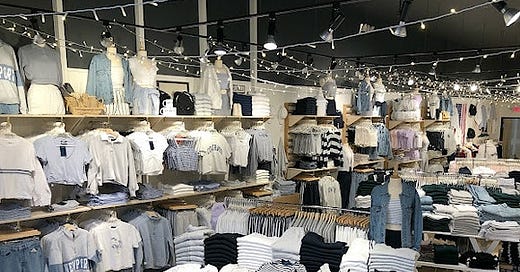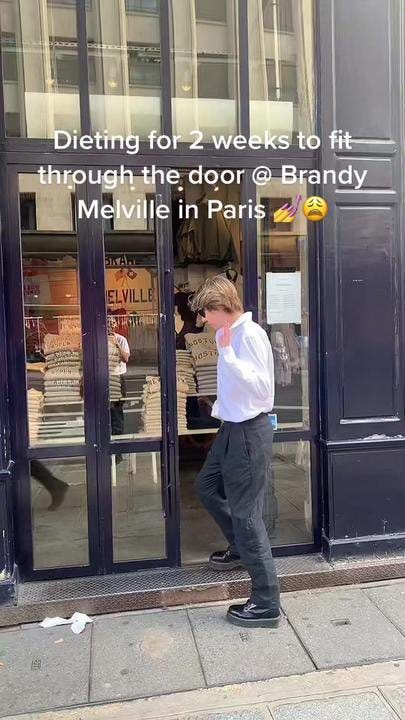Most have heard of the picture-perfect fast-fashion brand called Brandy Melville. Piles of one-size-fits-all shirts, jackets, and pants are stacked in a seemingly chaotic system, making one unable to find what they want. Tin baskets of cute underwear are lying around the store. One never feels quite safe enough in those curtained dressing rooms that barely cover your knees. The cashiers are unhelpful in a popular-girl, unattainable sense— in an almost beautiful way. Yet we all subscribe to this store with vigor.
What about Brandy Melville makes girls travel to Santana Row to snap pictures of the insides, just to post aesthetically on Instagram? How do the storefronts seem to have a gravitational pull inside that preteens and teenage girls just can’t ignore?
What about it has grasped my peers?
It begins to not be the generic graphic tees we adorn, but with the girl that comes with it. She’s skinny, white, impossibly blonde, and though she may not say it out loud, she is wealthy to a degree. And what young girl wouldn’t want to be that? She is the epitome of American teenage dreams; she is the idealized perfection we all yearn for. Instantly recognizable by the clothes she dons from Brandy Melville, and becoming immediately associated with the stereotype that arrives with it. To an extent, it aligns with a teenage girl’s American Dream.
The American Dream aligns with wealth and social mobility; the notion that anyone can succeed with dedication and hard work. A girl (and I say this in an annoyingly stereotypical sense that should not be attributed to my personal beliefs) should strive for beauty and a sense of mystique and flawlessness. It’s no crime to desire beauty, but it is so engrained in our society that to not desire it is frowned upon, even subconsciously. The Brandy Melville Girl is beautiful— it’s what’s been associated with the brand ever since they began hiring teenage girls based on their appearance. To gain access into the Brandy world, one had to be beautiful.
A while ago, the Brandy Melville store in Paris had a trending door. It was so impossibly small that videos were posted of people shimmying through sideways to get through. People would make jokes that they would specifically diet in order to fit through, all to access the store. There’s no greater example than this.
The exclusivity is part of what makes it so desired. If you fit into Brandy Melville, it means that you’re skinny enough to be beautiful, and so many crave that feeling. Making a brand seem exclusive to the beautiful is an effective strategy to draw in teenage girls. The correlation allows people to believe that buying into Brandy Melville will make one beautiful. That’s why people keep buying into it.
I'm even guilty of this. When my best friend and I went to New York City together, we traversed down to SoHo to visit the Brandy Melville flagship. What an experience! We waited in a long line of similarly aged teenage girls, before being released into what could best be described as a hellscape. A rich cacophony of yells and hurried movement flooded my ears as I surveyed the piles of haphazardly placed clothes. The fitting rooms proved no better— I felt as if the curtain that I had to hold close was only truly covering my top half. The cashiers who checked me out were undeniably beautiful, and failed to acknowledge me in fears of disrupting their conversation.
It was a shining and stereotypical example of the Brandy Melville experience. I kind of hated it, yet I would likely go back.
Brandy Melville isn’t unique in attracting teenage girls; there have been countless defining trends and brands. But it appears to have a level of persistence within its audience. The store has become a symbol for that certain sort of girl— popular, skinny, beautiful, and perfect.
It offers a gateway into becoming the “perfect” girl, which is what so many girls want to become.








do not recommend the changing rooms if you are below 5 feet
This caption had me writhing in confusion.
Addy, I have nothing but disregard for writing today; reading such ineloquent text on an electronic screen pains me. As in George Orwell's 1984, it has become clear that the dystopia of consumerism and governmental control has spread into all aspects of our lives. The absurdity of consumer dynamics in relation to the economic disparities found in the global market calls me to wonder: have you no shame, Adalyn Michelle Lowe!?
Warm regards,
Ben Dover
[3/17/2025]
ben.dover@hotmail.com